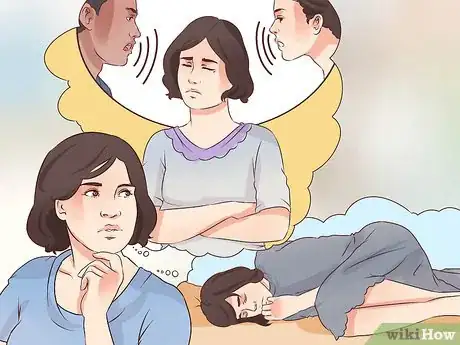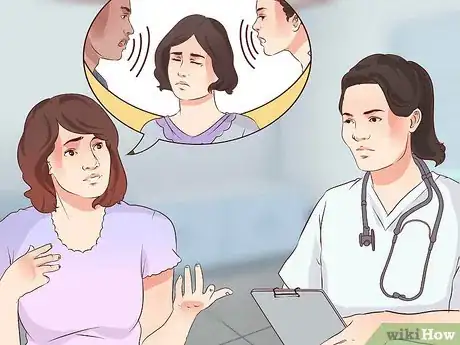This article was co-authored by Trudi Griffin, LPC, MS. Trudi Griffin is a Licensed Professional Counselor in Wisconsin specializing in Addictions and Mental Health. She provides therapy to people who struggle with addictions, mental health, and trauma in community health settings and private practice. She received her MS in Clinical Mental Health Counseling from Marquette University in 2011.
This article has been viewed 88,184 times.
Most people hear the occasional voice or have a weird thought from time to time. Sometimes, though, this can be a sign of serious mental problems that do not resolve themselves but need medical intervention. If you are hearing voices or think that your thoughts are abnormal, it might be time to have a talk with your doctor or mental health professional about them.
Steps
Seeking Help for Unwanted Thoughts and Voices
-
1Determine the impact of your voice(s). It is not uncommon for people to experience auditory hallucinations, or sounds and voices in their head. Often, this happens as you are drifting off to sleep or waking up out of a dream. Other times, these voices can happen occasionally throughout your day. As long as you know that the voice is not some other real person, then you can replace it by purposely thinking of something else -- and then they are not dangerous. If they make you feel anxious, spied upon, threatened, or manipulated you should seek immediate medical assistance. Contact a psychiatrist or doctor right away.[1]
-
2Consider the “type” of voice you are hearing. Hearing a voice could be something as simple as hearing your favorite song repeating in your head. A voice can also manifest with its own personality. A voice's personality may be kind, positive and encouraging. Another voice can leave you feeling confused, controlled or upset. You might hear various voices, or just one. If you have trouble keeping the voice(s) controlled by positive/purposeful thinking about work, daily events and can not keep it all straight, try writing things down. Use a journal to analyze, and to show your counselor or doctor.[2]Advertisement
-
3Change the way you think about the voices. This is a process known as reframing them.[3] Rather than thinking of your voice as something that you can’t control and need to hide from, you can bring it to your personal awareness to begin to control it. But, do this silently without involving other people. It would only confuse or alarm fellow workers or bystanders. Fully be aware of the voice and realize that it is not based in audible reality. This allows you to think about the voice from a perspective where you have the control, and avoids stressing you out.
- Voices tend to get more intense when a person is stressed.
-
4Discuss the voices with your doctor. Though auditory hallucinations are experienced by most people in some form or fashion, they are also possibly symptoms of bipolar disorder, dissociative disorders, alzheimer's disease, depression, mania, or schizophrenia. If you are hearing voices, especially if you feel that they are beyond your control, you should consult your doctor. It is best to detect these disorders as early as possible. Proper testing will need to be done to diagnose or dismiss these disorders. You cannot self-diagnose these disorders.[4]
- Research has shown that some of the worst parts of a serious disorder such as schizophrenia can be avoided in some patients if it is detected in the early, or prodromal, stages.[5]
- Testing for mental disorders usually come with a psychological evaluation, but in some cases your doctor may need to check for reaction to a medicine, for a brain tumor, blood vessel blockage problems (similar to a stroke) and so may perform a physical exam with blood tests, and order a CT scan or another lab test of some kind.
-
5Think back to any trauma. Many people report that they started hearing a voice after a highly emotional experience. This can sometimes be a spiritual experience, but is more often reported as a traumatic experience. Make a note of when you started hearing voices and if it correlates to any trauma. Pinpointing the cause of the voices might help you to manage them.
- Common types of trauma are an accident, an assault, social humiliation, or the loss of a loved one. There are other experiences that can be traumatic, as well. It is more about the impact the experience makes on you rather than what the experience actually was.
-
6Have your health evaluated. Mental disorders, such as schizophrenia, are not necessarily the only health problems that can lead to hearing voices. Being chronically dehydrated or malnourished can lead to hearing voices. Sleep deprivation is also known to cause hallucinations.
-
7Know your stress levels. Everyone experiences stress throughout the course of a day. This “normal” amount of stress is not likely to cause a healthy person to hear voices. However, if you do not cope well with your stress and allow it to accumulate for long periods of time, it is possible that you might begin experiencing hallucinations as a result.
Diagnosing and Treating Schizophrenia
-
1Get tested for schizophrenia. There is no physical test that is currently approved to diagnose schizophrenia. Instead, it is diagnosed by a clinical professional. The diagnosis requires that you show at least two (or one extreme) Category A symptoms, unless you are having bizarre hallucinations, hearing a constant voice that is commenting on your thoughts and behaviors, or two or more voices talking to each other.[6]
- Category A symptoms are classified as either positive or negative. Positive symptoms are an excess of normal function and negative symptoms are a decrease of normal functions.
-
2Discuss treatment options with your doctor. Medication, in the form of antipsychotics, is the best tool for treating schizophrenia. That being said, there are other treatments that can be used to complement the antipsychotics. These include, but are not limited to, additional medications for additional symptoms, therapy, support groups, transcranial magnetic stimulation, supplements, and diet.
-
3Follow your treatment plan. Once a treatment plan is made with your doctor, it is important that you follow it. Even if you are feeling well, you should not stop taking your medication. Do this only if your doctor advises you to.[7]
Diagnosing and Treating Depression, Mania, and Bipolar Disorder
-
1Ask your doctor about these disorders. Your doctor will evaluate you for symptoms of mania and depression. The existence of both indicates bipolar disorder. In other words, you can be manic, depressed, or, if you go back and forth between the two, bipolar.[8]
- Mania is characterized by feeling “wired” or hyper and excessively happy or important. You also might have uncontrollable thoughts and engage in risky behaviors that you wouldn’t normally do.
- Depression is characterized by feeling overly sad or tired and having no desire to do pleasurable things. To be clinically diagnosed, the symptoms need to persist for two or more weeks.
-
2Evaluate the treatment options available to you. Mood stabilizing medications are usually used on a long term basis to prevent or lessen manic, depressive, or bipolar episodes. Therapy is also a regular go to since it helps heal the damages that the disorder has likely caused during your life. It is also a good idea to get educated about your disorder and how you might change your lifestyle to manage it.[9]
-
3Adjust your treatment plan as your doctor suggests. As time goes on, your doctor may see the need for changing your medication or dosage. They might also suggest a different type of therapy or participating in a support group. Be open to what your doctor has to say and communicate openly with them about how you are doing overall.[10]
Treating Dissociative Identity Disorders
-
1Contact a doctor about dissociative identity disorder. This disorder is characterized by a fragmenting of your personality. Two or more distinct personalities will exist within the same person, and take turns controlling the person's (the host) body.[11] Until the mid 1990s the disorder was known as multiple personalities disorder.
-
2Find out what treatments are available for this disorder. There are no medications that treat dissociative identity disorder. Instead, therapy is used with the goal of reunifying the fragmented personality.[12] This is usually a form of psychotherapy, but can sometimes include other therapies such as cognitive or creative therapy.
- Medications may be prescribed to help manage other mental health symptoms that arise from dissociative identity disorder, but they do not treat the disorder directly. [13]
-
3Stick to a treatment plan. Reunifying a fragmented personality can take a long time. You should stick with your therapy for as long as your doctor recommends. Even if symptoms lessen, the therapy may still be important to keep the disorder under control.
Warnings
- Do not allow voices to give you instructions.⧼thumbs_response⧽
- See a medical professional immediately if you are thinking of hurting anyone.⧼thumbs_response⧽
- If you are flustered by your thoughts or voices, seek medical help.⧼thumbs_response⧽
References
- ↑ https://www.psychiatrictimes.com/view/auditory-hallucinations-psychiatric-illness
- ↑ https://www.psychiatrictimes.com/view/auditory-hallucinations-psychiatric-illness
- ↑ https://academic.oup.com/schizophreniabulletin/article/40/Suppl_4/S202/1875863
- ↑ https://www.psychiatrictimes.com/view/auditory-hallucinations-psychiatric-illness
- ↑ http://www.ncbi.nlm.nih.gov/pmc/articles/PMC2738348/
- ↑ https://www.psychiatrictimes.com/view/auditory-hallucinations-psychiatric-illness
- ↑ https://www.psychiatrictimes.com/view/auditory-hallucinations-psychiatric-illness
- ↑ http://psychcentral.com/lib/whats-the-difference-between-depression-and-manic-depression/
- ↑ http://www.helpguide.org/articles/bipolar-disorder/bipolar-disorder-treatment.htm
- ↑ http://www.helpguide.org/articles/bipolar-disorder/bipolar-disorder-treatment.htm
- ↑ https://my.clevelandclinic.org/health/diseases/9792-dissociative-identity-disorder-multiple-personality-disorder
- ↑ https://my.clevelandclinic.org/health/diseases/9792-dissociative-identity-disorder-multiple-personality-disorder
- ↑ https://my.clevelandclinic.org/health/diseases/9792-dissociative-identity-disorder-multiple-personality-disorder
About This Article
It can be upsetting when you hear voices and weird thoughts in your head, but with some patience and support, it will be easier to block them out. Hearing voices in your head is pretty common, but if you feel like the voices are out of your control or they’re making you upset, talk to your doctor about it. Hearing voices can be a sign of a disorder, such as depression, dissociative disorder, or bipolar disorder. Weird voices can also pop up after you've experienced a traumatic event. Luckily, therapy or medication may be able to help you feel more like yourself again. Voices and weird thoughts can also be a sign that you’re stressed out, so try to take some time to relax outside of your work. To learn more about disorders that can cause unwanted thoughts and voices, read more from our co-author.























-Step-17-Version-2.webp)






















































Medical Disclaimer
The content of this article is not intended to be a substitute for professional medical advice, examination, diagnosis, or treatment. You should always contact your doctor or other qualified healthcare professional before starting, changing, or stopping any kind of health treatment.
Read More...